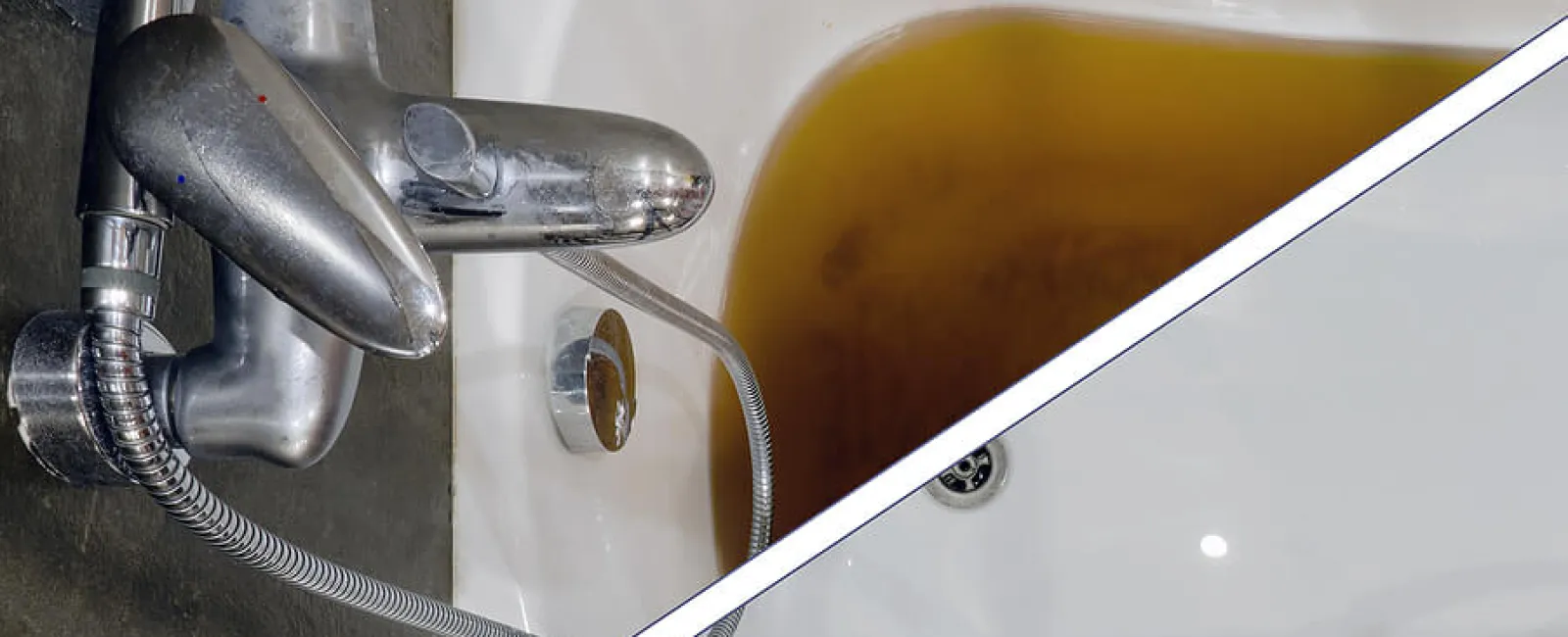Explanations for Effluent Rising Through the Bathtub
Explanations for Effluent Rising Through the Bathtub
Blog Article
Everybody may have their unique idea in relation to Why sewage is coming up through your bathtub.

Sewer backup in the bathtub can be a distressing and unhygienic problem for any type of home owner. Not just is it bothersome, however it additionally postures significant wellness threats and suggests underlying problems with the plumbing system. Understanding why sewage is coming up through the bathtub is essential for taking ideal activity to resolve the issue successfully.
Intro to the Issue
Understanding the Problem
When sewage starts backing up into the tub, it's a clear indication of an issue with the water drainage system. The wastewater that must be moving far from your home is instead discovering its back right into your home, which can result in significant damages and carcinogen.
Possible Reasons
Numerous aspects can contribute to sewage backup in the tub. From clogs in the sewer line to problems with the plumbing framework, determining the origin is vital for finding a solution.
Common Reasons for Sewage Backup
Clogs in the Drain Line
Among the most common root causes of sewer back-up is a blockage in the sewer line. This can occur due to the buildup of particles, oil, or international items in the pipes, avoiding appropriate circulation and causing sewage to back up right into your bath tub.
Tree Origin Breach
Tree roots seeking dampness and nutrients can infiltrate sewage system lines via little cracks or joints. Over time, these origins can expand and expand, creating significant damages to the pipelines and resulting in sewage backup problems.
Aging Infrastructure
Older homes might have obsoleted plumbing systems that are extra vulnerable to corrosion, fractures, and damage. As pipelines age, they become extra prone to leakages and clogs, boosting the likelihood of sewage back-up cases.
Heavy Rainfall or Flooding
During durations of heavy rainfall or flooding, the sewer system might come to be overwhelmed with excess water, causing backups and overflows. This can result in sewer supporting right into bathtubs and other fixtures inside the home.
Wellness Risks Associated with Sewage Backup
Contamination of Water Supply
Sewage backup can infect the water supply in your home, positioning a serious wellness threat to you and your family members. Direct exposure to contaminated water can bring about gastrointestinal problems, skin infections, and various other illnesses.
Spread of Disease
Sewer includes dangerous germs, infections, and parasites that can trigger a variety of conditions, consisting of liver disease, cholera, and gastroenteritis. Entering into contact with sewer or contaminated surfaces puts you in danger of infection.
Mold Growth
Moisture from sewage back-up can produce suitable conditions for mold and mildew growth in your house. Mold spores can aggravate breathing problems and create allergies in sensitive individuals, making timely clean-up important.
Indicators of Sewer Backup
Foul Odors
Undesirable smells rising from drains pipes or fixtures, particularly in the shower room, may indicate sewer back-up concerns. These odors are usually solid and relentless, indicating a trouble that calls for instant interest.
Slow Draining Fixtures
Bath tubs, sinks, and commodes that drain gradually or not whatsoever could be experiencing sewage back-up. If multiple components are impacted concurrently, it's most likely that the issue originates from a common point, such as the main drain line.
Gurgling Noises
Strange gurgling or gurgling noises coming from drains pipes when water is running in other places in your home are a measure of air caught in the plumbing system. This air accumulation can result from sewer backup and should be checked out without delay.
Immediate Actions to Take
Turning Off Water Supply
In the event of sewer backup, it's essential to turn off the water supply to avoid more contamination and damages. Locate the primary water shutoff valve in your house and closed it off up until the issue can be dealt with.
Calling a Specialist Plumber
Taking care of sewer back-up is not a DIY job. Contact an accredited plumber with experience in handling sewage-related issues to assess the scenario and carry out needed repair work or cleanings.
Preventing Contact with Infected Water
Up until the sewage backup is settled, prevent contact with contaminated water to avoid the spread of bacteria and virus. Put on safety equipment if you must remain in the affected area and clean your hands thoroughly later.
Safety nets
Normal Maintenance of Sewer Lines
Schedule routine assessments and upkeep of your drain lines to identify and resolve potential issues prior to they rise into significant problems. This can consist of cleaning debris, checking for tree root invasion, and fixing any type of broken pipes.
Setting Up Backwater Shutoffs
Take into consideration mounting bayou shutoffs in your plumbing system to prevent sewage from receding right into your home throughout durations of heavy rainfall or flooding. These shutoffs immediately close when water starts backing up, shielding your home from contamination.
Proper Disposal of Home Waste
Avoid purging anything besides toilet tissue and human waste down the toilet to stop obstructions and obstructions in the drain line. Dispose of oil, oil, and various other household chemicals correctly to minimize the risk of plumbing issues.
Tidying up After Sewer Back-up
Disinfection Procedures
Completely sanitize and sanitize influenced locations after sewer back-up to get rid of damaging bacteria and protect against mold and mildew growth. Use suitable cleaning items and safety equipment to guarantee safe and efficient clean-up.
Restoration of Influenced Locations
Fix any type of damage to floor covering, wall surfaces, or components caused by sewer backup. Relying on the degree of the damage, you might require to replace carpets, drywall, or various other products to recover your home to its pre-loss problem.
Why is There Sewage Coming Up Through the Bathtub
Sewage in your bathtub is a major problem that can make you want to abandon the bathroom for good. You don’t have to. However, it is important to identify the source of the issue and take the necessary steps to resolve it in order to avoid any health risks and property damage. In this article, we will discuss what could be causing sewage to back up through your bathtub so you can take action quickly and effectively.
The Main Reason For Sewage Backup in The Bathtub
All the sinks and toilets in your home connect to different pipes that lead to the main sewer line. The sewer line then connects to the municipal sewer system. This connection works seamlessly on a daily basis, but there can sometimes be a problem with the main sewer line.
The most common cause of sewage backup is a clogged or blocked main sewer line. The main sewer line can be clogged due to the accumulation of debris, tree roots or grease buildup, or other materials. Another possible cause is a collapsed pipe. When this happens, your toilets and sinks won’t be able to drain properly. This is when sewage starts backing up through the bathtub. If the problem has been occurring for some time now, it might be time to consult with a plumber as there may be more severe damage that needs fixing.
How Can You Tell if it’s Coming From Your Sewer Line?
If you’re experiencing a sewage backup in your bathtub, then you can use a few simple methods to determine if it is coming from the main sewer line. First, try to unclog the tub drain with a plunger or an auger and see if that helps. If not, then inspect all of the drains in your house and check if there is any blockage in them. If some of the other drains are not working fine, then it’s likely the problem is with your main sewer line.
Common Signs of a Clogged Main Sewer Line
If you suspect that your main sewer line is blocked, then there are a few common signs to look out for. Frequent clogs in your home are a sure sign of a clogged sewer line. You can also check for slow drainage from all the plumbing fixtures.
Slow Drains
If you notice that it takes longer for your sinks and toilets to drain, then this could be a sign of a clogged main sewer line.
Frequent Clogs
Another common sign is that your drains or toilets become clogged almost all of the time. If this happens, then it could be a sign that the main sewer line is blocked.
Water Backup
Do you notice water or sewage coming back up from any of the drains in your home? If your answer is yes, you may have a clogged main sewer line.
Sinkholes
If you’ve noticed sinkholes in your yard or overflowing sewage from the ground, you may be facing a blocked sewer line issue.
Your Shower or Sink Makes Gurgling Noises
Have you noticed gurgling noises coming from your sink or shower lately? These are typically signs of a blocked sewer line and should be checked out immediately.
How to Prevent a Main Sewer Line Clog
Once you’ve identified that your main sewer line is clogged, it’s important to take steps to prevent it from happening again. The best way to do this is to avoid putting any solid material that can clog the drain, such as grease and other debris. You should also be mindful of what you flush down your toilet. In addition, you should schedule regular maintenance for your main sewer line. This will help keep it clear and free from clogs or backups.
What Should You do if You Notice Sewage Backing up Through The Bathtub?
If you’ve noticed sewage backing up through the bathtub, then it is important to call a professional plumber immediately. A plumber can inspect the situation and determine what the cause is, such as a blocked main sewer line. They will also be able to advise you on how best to fix the issue. In some cases, a simple drain cleaning may be all that is needed.
However, if the blockage is severe, then your plumber may need to use more advanced methods to clear the blockage.
No matter what, it is important to always call a professional plumber if you experience any kind of sewage backup. They will be able to assess the situation and provide you with a solution that is best for your home.
https://baylorinc.com/blog/why-is-there-sewage-coming-up-through-the-bathtub/

Do you really like reading about Why sewage is coming up through your bathtub? Give a short review further down. We'd be pleased to know your ideas about this post. In hopes that you visit us again later on. Appreciated our review? Please quickly share it. Help other people check it out. Thanks for being here. Revisit us soon.
Estimating
Report this page